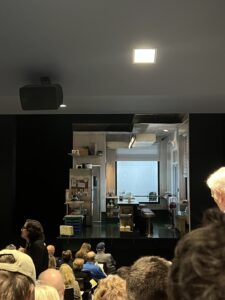The Counter is a production that depicts the intricate relationship between two main characters, Paul and Katie. Paul is an old man who is a regular customer at the café in which Katie works. Prior to viewing the play, I felt dreadful because I am not a particular fan of live productions. Although I did not particularly enjoy watching this performance, I would not necessarily say that it was terrible. One of my immediate thoughts was that the actors undeniably performed very well. All three roles were capable of effectively embodying their assigned characters, however this factor was not enough to make the experience enjoyable for me. I personally felt significantly detached from a majority of the audience because I noticed that the popular spectating demographic consisted of elderly individuals, therefore I also found myself not understanding occasional phrases or what were supposed to be humorous remarks.
Nevertheless, I was ultimately able to identify multiple central themes of the piece. Originally, I believed that the message simply consisted of friendship, however throughout the show’s progression, new aspects were gradually introduced, culminating into various interpretations. Regarding the setup, I felt slightly confused by the timeline, as the switching of lighting was very frequent and sometimes I was not able to depict the significance of a seemingly new day. I would also notice that Katie and Paul often left the setting without speaking any words of farewell, which seemed strange, causing further confusion. Initially, Katie and Paul would conduct minimal conversation and I felt substantially disengaged due to the lack of dynamic qualities. What initially seemed like both characters merely sharing their life trauma soon turned into a deeper plot, exploring the importance of patience, second-chances, and taking risks. As the relationship between both individuals unfolds, they share personal flaws, providing the other with remedying advice without realizing the hipocricy within their statements. Katie admits her past failed relationships, revealing that she created a new life within the town she now lives in. Paul critiques her decision, claiming that she acted like a coward, running away from a minimal problem and forming an ironically false reality. Katie denies this personal attack, only to direct one of her own toward Paul when he spontaneously asks her to poison him. This transforms into a historical depth to Paul’s circumstances, as he persuades Katie to “surprise” him and in doing so, provide a shocking factor that has been absent from a majority of his life, causing feelings of depression, despair, and worthlessness. As the play progresses, both characters slowly help each other persevere through their individual struggles, ending with the unexpected return of Katie’s former friend. Not only does this provide Katie with an immediate resolution to face her old life again and start fresh, but it also provides Paul with what he has been looking for his entire life: a surprise.
In the end, both characters seemingly received their “happy endings”, although on an unfinished note, leaving the rest up to the interpretations of the audience. Some important lessons that may be deduced from this play may include the importance of recognizing human intricacy and that communication is vital within the need for mutual support and understanding. All people experience their unique encounters and the ability to confide in others without losing hope or determination is what defines the individual in continuing to live with optimism, strength, and hope, essentially self-same to Paul and Katie.



